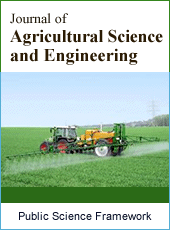Journal of Agricultural Science and Engineering
Articles Information
Journal of Agricultural Science and Engineering, Vol.5, No.2, Jun. 2019, Pub. Date: Jul. 13, 2019
Potential Impact of Climate Change on Wheat Production in Cambridgeshire, UK
Pages: 56-60 Views: 2369 Downloads: 604
[01]
Olufemi Samson Adesina, Department of Food Security, University of Warwick, Coventry, United Kingdom.
[02]
Ibrahim Mohammed, Department of Environmental Bioscience in a Changing Climate, University of Warwick, Coventry, United Kingdom.
Wheat is a major food crop in the UK and worldwide. Moreover, the UK grows winter wheat extensively due to suitable climatic conditions. However, the frequency and severity of extreme weather events are likely to rise with global warming. Droughts and high temperatures are known to have substantial impacts on crop growth. Thus, this study accessed the potential impact of climate change on wheat production in Cambridgeshire in the 2080s, specifically assessing the potential impacts from drought, heatwaves, and effect on fertility. Data analysis includes 5 different runs (runs 96, 97, 98, 99, 100) of the weather Generator sourced from the UKCP09 website. The result shows that droughts and high-temperature days will be more frequent in future summer months, and heatwaves more frequent and longer in duration. It is likely that high temperatures will have the largest impact on wheat production in a future climate as opposed to drought, and the risk of reduction in fertility will also increase. In all, the study presents a slight increase in drought and a significant increase in temperature in the future, while the extremely high temperature will increase the risk of crop losses. However, early maturity appears to be more beneficial in the future due to increasing temperature.
Wheat Production, Climate Change, UK
[01]
Asseng, S., Foster, I. and Turner, N. (2011). The impact of temperature variability on wheat yields. Global Change Biology, 17 (2), pp. 997-1012.
[02]
Grain Chain, 2016. Wheat farming in the UK. Avaliable from: https://www.grainchain.com/sites/default/files/14-16%20Wheat%20farming%20in%20the%20UK%20presentation.pdf
[03]
Licker, R., Kucharik, C. J., Dore, T., Lindeman, M. J. & Makowski, D. (2013) Climatic impacts on winter wheat yields in Picardy, France and Rostov, Russia: 1973-2010. Agricultural and Forest Meteorology, 176 25-37.
[04]
Prasad, P. and Djanaguiraman, M. (2014). Response of floret fertility and individual grain weight of wheat to high temperature stress: sensitive stages and thresholds for temperature and duration. Functional Plant Biology, 41 (12), p. 1261.
[05]
Jenkins GJ, Murphy JM, Sexton DS, Lowe JA, Jones P, Kilsby CG (2009) UK climate projections: briefing report. Met Office Hadley Centre, Exeter.
[06]
IPCC. (2013): Summary for Policymakers. In: Climate Change 2013: The Physical Science Basis. Contribution of Working Group I to the Fifth Assessment Report of the Intergovernmental Panel on Climate Change [Stocker, T. F., D. Qin, G.-K. Plattner, M. Tignor, S. K. Allen, J. Boschung, A. Nauels, Y. Xia, V. Bex and P. M. Midgley (eds.)]. Cambridge University Press, Cambridge, United Kingdom and New York, NY, USA.
[07]
UKCP09 climate projection webpage: http://ukclimateprojections.metoffice.gov.uk/.
[08]
Agriculture and Horticulture Development Board, 2018, AHDB Cereals & Oilseeds. Available at: https://cereals.ahdb.org.uk/media/185687/g66-wheat-growth-guide.pdf
[09]
Song, Y. L., Chen, D. L. & Dong, W. J. (2006) Influence of climate on winter wheat productivity in different climate regions of China, 1961-2000. Climate Research, 32 (3): 219-227.
[10]
Takac, J. & Siska, B. (2009) Climate Change Impact on Spring Barley and Winter Wheat Yields on Danubian Lowland. Bioclimatology and Natural Hazards.
[11]
Harrison PA, Butterfield RE (2000) Modelling climate change impacts on wheat, potato and grapevine in Europe. In: Downing TE, Harrison PA, Butterfield RE, Lonsdale KG (eds) Climate change, climate variability and agriculture in Europe: an integrated assessment. Res Rep 21. Environmental Change Unit, University of Oxford, Oxford, p 367−390.
[12]
Cho, K., Falloon, P., Gornall, J., Betts, R. and Clark, R. (2012). Winter wheat yields in the UK: uncertainties in climate and management impacts. Climate Research, 54 (1), pp. 49-68.
[13]
Machado, S. & Paulsen, G. M. (2001) Combined effects of drought and high temperature on water relations of wheat and sorghum. Plant and Soil, 233 (2): 179-187.
[14]
Tubiello FN, Donatelli M, Rosenzweig C, Stockle CO (2000) Effects of climate change and elevated CO2 on cropping systems: model predictions at two Italian locations. Eur J Agron 13: 179−189.
[15]
Trnka M, Dubrovsky M, Seneradova D, Zalud Z (2004) Projections of uncertainties in climate change scenarios into expected winter wheat yields. Theor Appl Climatol 77: 229−249.

ISSN Print: 2381-6821
ISSN Online: 2381-6848
Current Issue:
Vol. 7, Issue 4, December Submit a Manuscript Join Editorial Board Join Reviewer Team
ISSN Online: 2381-6848
Current Issue:
Vol. 7, Issue 4, December Submit a Manuscript Join Editorial Board Join Reviewer Team
| About This Journal |
| All Issues |
| Open Access |
| Indexing |
| Payment Information |
| Author Guidelines |
| Review Process |
| Publication Ethics |
| Editorial Board |
| Peer Reviewers |


